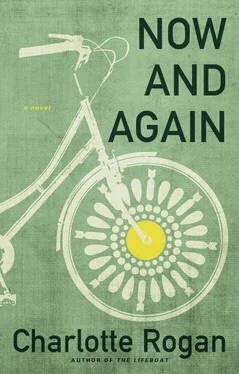“We’re cooking for the guys tonight,” said E’Laine after shaking hands with Martin. “You’re welcome to stay for dinner if you like.”
“Thanks. I’d like to meet everyone involved with this project. I’m hoping they can help me with my article, and in return, I can help them publicize the site. The more publicity, the more traffic, and the more traffic, the more donations — that sort of thing.”
“Sure,” said E’Laine. “I’ll set another place.”
Le Roy swiveled his chair to see E’Laine. He thought about how his chair could be turning on its axle, or it could be that with a mere push of his foot, he’d sent the entire universe spinning around his chair. “Oh,” he said. “Oh, yeah.”
Martin said he had an errand to run, so Le Roy got back to work. He put on his headphones. He turned up the volume to the point where the room went away and it was just him and the screen and the liquid slip of the keys under his fingers. He liked to tap in time to the music, which made it seem like he was the one playing the keyboard, and if the train just happened to come through as it did now, all the better for the bass. He entered another line of code and felt like a master of the universe, even if his universe was still small. Once he got tired of the website, he’d try something bigger. He wasn’t joking about simulations, which were a combination of games and real life and were starting to get some press.
He kept his eyes on the computer screen, but the sides of his face could feel E’Laine walking toward the door with Martin. Probably she was only seeing him out, but maybe she was going with him. E’Laine had a mind of her own. He knew he could tap and tap and he couldn’t keep her from going with the reporter if that’s what she wanted to do. The tiny gap threatened to open up again. Then she was waving — he couldn’t tell if it was to catch his attention or to say good-bye to the reporter. He felt a slight unraveling in his chest as if he wanted to tell her something, but then he typed another line of code and E’Laine was gone. Martin Fitch was gone. Everything was gone but the screen in front of him until Danny came back with some books under his arm and a few minutes after that the captain and Kelly returned with the supplies. Danny made sure everything was in order — the tape on the tape shelf and the coffee on the coffee shelf — while Kelly answered the phone when it rang, and the thing that had clicked out of place when E’Laine went out the door with Martin clicked back in until Kelly started shouting at the captain about something and Le Roy tuned him out.
In his simulation, Le Roy would make a world where everything was in its place, at least at the beginning — at least at what he thought of as ground zero or the big bang. He could set the parameters so that if Kelly or Danny went out the door, they were guaranteed to come back in again. That way, the people in the simulation who depended on Kelly and Danny would feel secure the way he felt now that his friends were back and the supplies were put away. But then he thought, What would that prove? The point of a simulation wasn’t to keep things static. The point was to shake things up. He’d like to see what happened if an alien race attacked those people who were feeling all safe — ha! Or if the icebergs melted all at once or if computerized robots started to make decisions for themselves. Like if the rich people somehow got the poor people to vote against their own interests and if the poor people ever figured it out. Or what if they were in a simulation now and just didn’t know it — a simulation within a simulation, he thought. Now that would be a project worth working on. Now that would be fucking cool.
10.2 Penn Sinclair
After Fitch’s article was published in the New York Times, leaked documents started to pour in to the site’s secure drop box from anonymous sources.
“Shee-it,” said Kelly. “Who’s sending us all this stuff?”
“Martin says we don’t want to know their names,” Penn told him. “It’s better for everybody that way.”
Le Roy increased site security and developed a network of volunteers to help with encryption and document authentication. Some of the documents needed to be redacted, so they developed another network for that.
“We all know Dolly’s name,” said Danny. “Does that put her in some kind of danger?”
“She’s not the insider who stole the document,” said Penn. “Outsiders are safe.”
“What about us?” asked Danny.
“We’re journalists,” said Kelly. “Journalists are protected by the First Amendment.”
“But probably not leakers,” said Penn. “Fitch says that the prevailing view is that they aren’t protected, even though some scholars disagree. Everything in this arena is changing pretty fast, and the law is far from settled. But the bottom line is that the less we know about the people sending us this stuff the better.”
The site’s email box was even busier than the drop box. One soldier wrote anonymously of participating in the Haditha massacre, where twenty-four unarmed Iraqis were shot at close range. Others wrote about being advised to carry drop weapons in case they killed the wrong person. Soldiers wrote about indiscriminately rounding up all able-bodied men and sending them to Abu Ghraib for processing, and interrogators at Abu Ghraib wrote about being overwhelmed and undertrained. There was footage of an Apache helicopter firing on men armed with what turned out to be cameras and more footage where a wedding party was the target of attack. In the forum section of the site, the soldiers asked each other how you could tell the right person from the wrong one, and the answer was you couldn’t.
They wrote about bellying up mountains through storms of artillery fire and about taking out snipers and disarming bombs and providing clean water and helping the local businesses that sprang up in areas that had been rife with sectarian violence, and then they wrote about how the sectarian violence crept back in as soon as the soldiers left.
Political operatives wrote about burying information in the run-up to the war and about inserting sentences into official speeches. A Vietnam vet sent a documentary of the Winter Soldier Investigation, which was intended to show that war crimes in Vietnam were a direct result of official policy, and another one told about how he’d been present at the Gulf of Tonkin — no torpedoes had been fired at U.S. warships that day, which meant a deadly and divisive conflict was started on a lie.
There were stories about how one third of veterans from the First Gulf War suffered from Gulf War Syndrome and how they were still fighting for treatment seventeen years later and how much of the debate centered on what to call the mysterious constellation of symptoms that was now starting to affect a new generation of returning soldiers and how what you called it had implications for how seriously it was taken. There were stories about how exposure to Vietnam-era Agent Orange was only getting official attention now that it was too late to help the men and women who had suffered from multiple myeloma or soft-tissue sarcoma or cancers of the lungs or larynx or trachea and finally died. There were stories of benefits delayed or denied, of soldiers who fought for their country overseas and then had to fight the bureaucracy at home.
There were statistics too: 148 combat casualties in the First Gulf War; 145 noncombat deaths. And explanations of the statistics: official figures for soldier deaths only counted those who died on the ground, not the ones who died on the C-130 taking them to the hospital or the ones who died after they landed in Germany or the ones who died at Walter Reed Medical Center or the ones who died a few years later from wounds or illnesses contracted during the war or the ones who waited eight or ten or fifteen years to die of worsening symptoms that were variously attributed to vaccinations, oil well fires, pesticide use, bacteria in the soil, anti — nerve agent pills, solvents, metal-laden dust, depleted uranium weapons, and infectious disease. Of 694,000 soldiers who served in Desert Storm, 115,000 would soon be dead. Of a group of eight friends, only two remained.
Читать дальше












